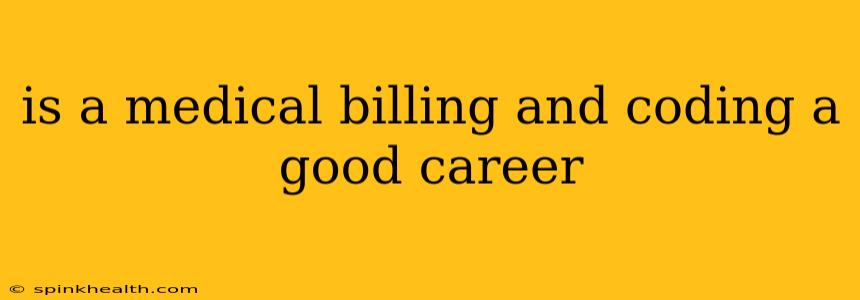Is a Medical Billing and Coding Career Right for You? A Deep Dive into the Field
The hum of the office, the satisfying click of the keyboard, the quiet satisfaction of knowing you're playing a crucial role in keeping healthcare afloat – that's the life of a medical biller and coder. But is it your life? This isn't just about crunching numbers; it's about navigating complex medical terminology, ensuring accurate patient records, and ultimately, contributing to the financial health of healthcare providers. Let's delve into whether a career in medical billing and coding is a good fit for you.
What Does a Medical Biller and Coder Do?
Imagine this: a patient receives treatment. The doctor carefully documents the procedures and diagnoses. That's where you come in. Medical billers and coders translate that medical jargon into standardized codes that insurance companies understand. You're the bridge between the medical world and the financial world. This involves:
- Coding: Assigning numerical and alphanumeric codes to medical procedures, diagnoses, and services using systems like ICD-10 and CPT. Think of it as translating medical language into a language insurance companies can process.
- Billing: Creating and submitting claims to insurance companies, following up on payments, and managing patient accounts. This requires meticulous attention to detail and a knack for navigating insurance regulations.
Is Medical Billing and Coding a Good Career Path? The Pros and Cons
Every career has its ups and downs. Let's weigh the pros and cons of a career in medical billing and coding to see if it aligns with your aspirations and personality.
Pros:
- High Demand: The healthcare industry is booming, and with it, the demand for skilled medical billers and coders. This translates into job security and potentially good earning potential.
- Relatively Affordable Education: Unlike many medical professions, entering medical billing and coding often requires a certificate or associate's degree, making it a more accessible career path.
- Remote Work Opportunities: Many medical billing and coding jobs can be done remotely, offering flexibility and work-life balance.
- Analytical and Detail-Oriented Work: If you enjoy working with numbers, analyzing data, and ensuring accuracy, this career can be highly rewarding.
- Making a Difference: You contribute directly to the financial well-being of healthcare providers, ensuring they can continue to offer vital services.
Cons:
- Repetitive Tasks: Some aspects of the job can be repetitive, which might be monotonous for some individuals.
- Constant Changes in Regulations: Medical billing and coding are constantly evolving with updates to coding systems and insurance regulations. Staying current requires ongoing professional development.
- Potential for Stress: Dealing with insurance denials and complex billing issues can be stressful.
- Limited Career Advancement: While advancement is possible, it might be limited compared to some other medical professions.
What are the Educational Requirements for Medical Billing and Coding?
H2: What Education and Training Do I Need to Become a Medical Biller and Coder?
Typically, you can enter this field with an associate's degree, diploma, or certificate from a vocational school or community college. These programs often offer hands-on training, covering medical terminology, coding systems (ICD-10, CPT, HCPCS), and billing processes. Some employers prefer candidates with a Certified Professional Coder (CPC) credential, which demonstrates a high level of competency.
What is the Salary and Job Outlook for Medical Billing and Coders?
H2: What is the Salary Range for Medical Billing and Coding Jobs?
Salaries vary based on experience, location, and employer. Entry-level positions may offer lower salaries, but with experience and certifications, the earning potential increases significantly. Online resources provide up-to-date salary information for specific regions.
H2: What is the Job Outlook for Medical Billing and Coding Professionals?
The job outlook is generally positive, with projections showing continued growth in the field. The aging population and the expanding healthcare industry contribute to this demand.
Is Medical Billing and Coding a Good Career for Me? Self-Reflection Questions
Before making a decision, ask yourself these crucial questions:
- Do I enjoy working with numbers and details?
- Am I comfortable with repetitive tasks?
- Do I have a strong attention to detail?
- Am I willing to commit to ongoing learning and professional development?
- Do I thrive in a fast-paced environment?
If you answered "yes" to most of these questions, a career in medical billing and coding might be a great fit for you. However, if you find yourself leaning towards "no," it's best to explore other career paths that better align with your skills and preferences.
Ultimately, the decision of whether a medical billing and coding career is "good" is deeply personal. It hinges on your individual skills, interests, and career goals. Thorough research, honest self-reflection, and potentially informational interviews with professionals in the field are your best allies in making this important career choice.

